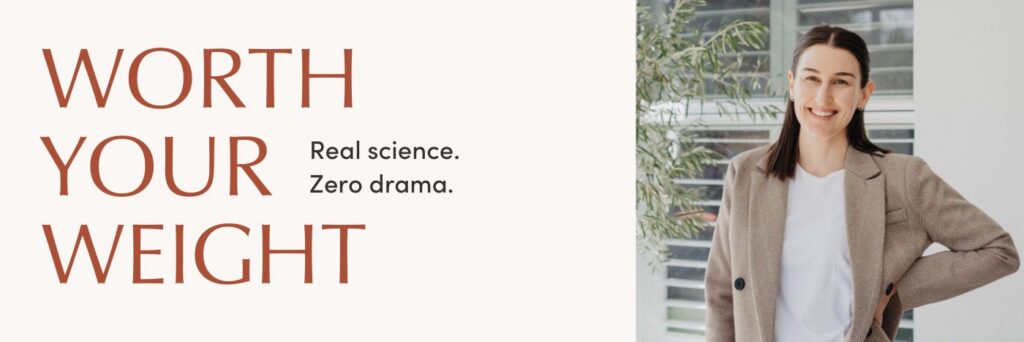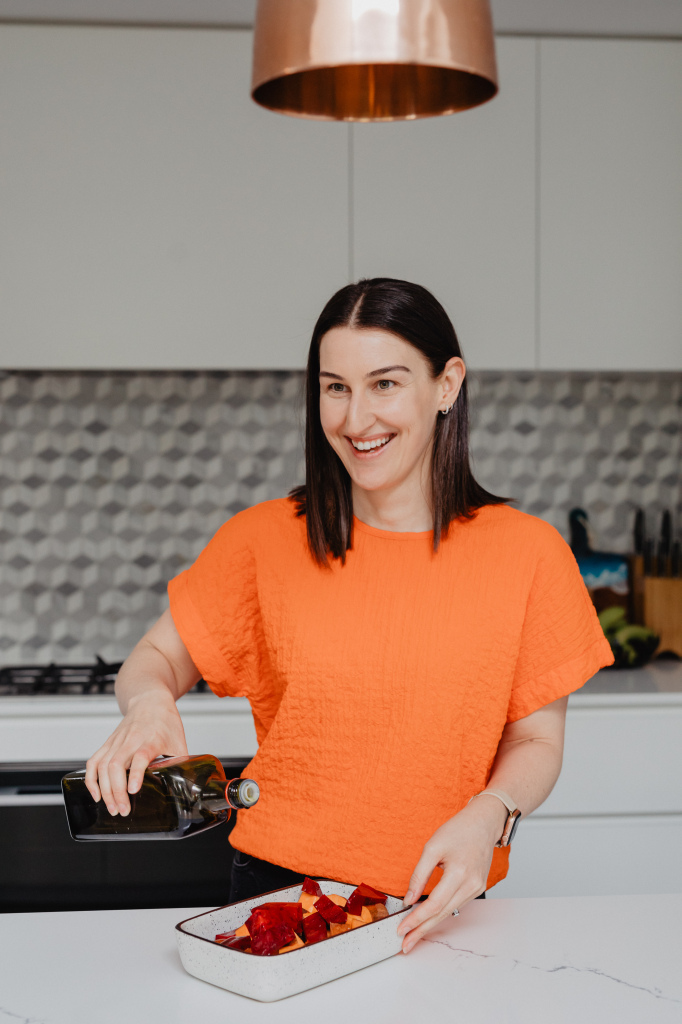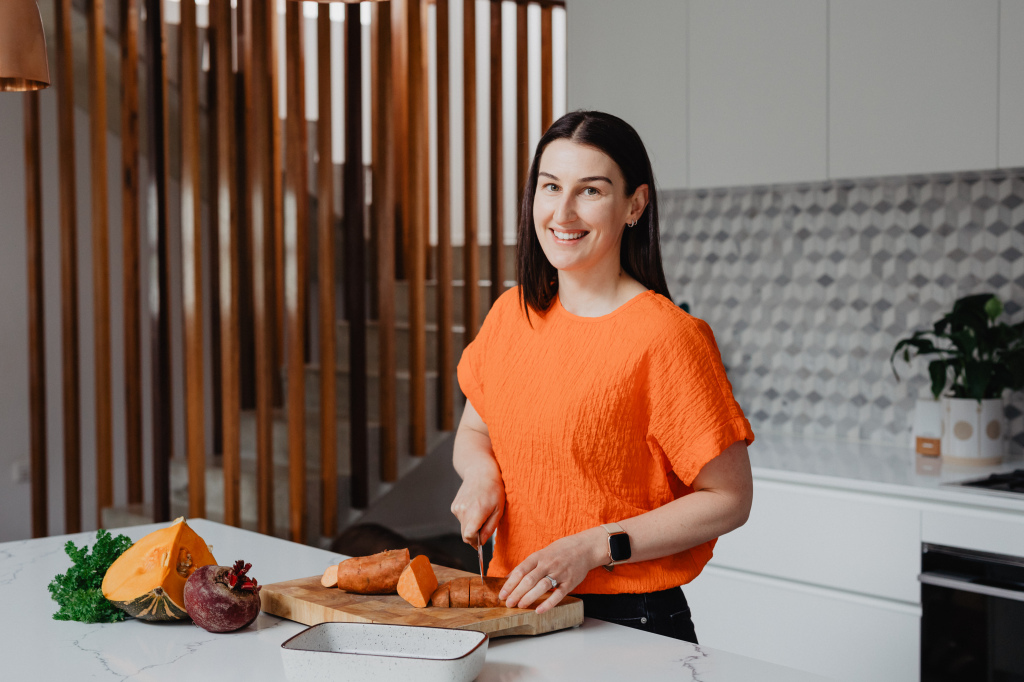- Introduction: Why We’re All Confused About Weight Loss
- Understanding How Weight Loss Actually Works
- What to Eat for Weight Loss
- When to Eat: Does Timing Really Matter?
- How to Eat: Habits That Stick
- Can You Lose Weight Without Exercise?
- How to Keep Weight Off for Good
- Beyond the Scale: Other Wins Worth Celebrating
- Red Flags to Watch Out For
- When to Get Support (and Who to Ask)
- Final Thoughts + Next Steps
- FAQs
Introduction: Why We’re All Confused About Weight Loss
If I had a dollar for every woman who’s told me, ‘I know what to do… I just can’t seem to do it,‘ I’d been on a beach in the Maldives right now.
Most of the women I see are smart, capable, and completely overwhelmed by information. Between Instagram experts, TikTok hacks, and the friend who swears by lemon water every morning, it’s no wonder no one knows what actually works anymore.
They don’t lack willpower; they’re drowning in conflicting advice.
The truth is, successful weight loss isn’t about how strict you can be for eight weeks – it’s about learning how to eat in a way that works for your body and your life. No detoxes. No diets. Just understanding the principles that make eating feel easy again.
👉 Related read: Why Is Weight Loss So Hard?
Understanding How Weight Loss Actually Works
Let’s clear up the biggest myth: you can’t hack weight loss.
Yes, weight loss happens when you burn more energy than you eat. But your body isn’t a calculator; it’s more like a dimmer switch – it adjusts based on sleep, stress, hormones, muscle mass, and even the season.
You could have two people exercising the same amount, yet one loses weight faster because her sleep and stress are under control. Studies have shown even a single night of poor sleep can increase hunger hormones like ghrelin (making you hungrier) and lower leptin, the one that tells you you’re full.
So if you’re eating well but feeling stuck, the issue isn’t always your food. It could be your environment.
The practical takeaway: instead of slashing calories, focus on creating balance — energy-wise and lifestyle-wise.
Explore:
- Why Sustainable Weight Loss Isn’t Sexy – But It Actually Works
- 3 Reasons You Can’t Lose Weight
- How Difficult Is Weight Loss?
What to Eat for Weight Loss
Here’s the thing: there’s no single ‘weight-loss food.’ What matters is how your meals come together most of the time.
Protein keeps you full and maintain muscle mass while you’re losing weight. You don’t need to live off chicken breast – Greek yoghurt, tofu, lentils, eggs and other lean meats all count.
Carbohydrates aren’t evil. They fuel your brain and workouts. Choose fibre-rich options like oats, rice, and whole-grain bread. Think portion-aware, not carb-free.
Fibre helps everything run smoother (literally). Vegetables, fruit, legumes, and wholegrains should fill half your plate.
Fats get a bad reputation, but they regulate hormones and help you absorb nutrients. But portion size here matters: a tablespoon of nuts, seeds, or olive oil per meal is plenty.
And yes, hydration matters. Even mild dehydration can mimic hunger. Aim for roughly 2 L a day – more if it’s hot or you’re active.
Read more:
- Weight Loss Nutritionist Reveals How Fibre Can Help You Lose Weight
- Nutrition for Weight Loss: Water Intake
💡 If meal planning makes your eyes glaze over, my Meal Plan Bundle gives you four seasonal 7-day plans that hit all the nutritional marks – and taste good enough for real life.
When to Eat: Does Timing Really Matter?
Let’s talk timing – one of the internet’s favourite debates.
“Never eat after 8 pm.” “Breakfast is non-negotiable.” “Fast till noon.” Heard it all? So have I.
Here’s the truth: the total pattern of what and how much you eat matters more than the clock. Still, timing can shape your energy, hunger, and cravings.
For example, a balanced breakfast can prevent that 3pm crash. For others, a later eating window (like 10 am–6 pm) feels more natural. The best schedule is the one that keeps you satisfied and consistent.
If you’re curious about fasting, understand the research first. Intermittent fasting can work – but only because it helps some people eat less overall, not because it magically burns fat. The women it backfires on are usually the ones who get ravenous and over-compensate later.
👉 Fasting for Weight Loss: What the Research Really Says
How to Eat: Habits That Stick
Most women don’t need more nutrition facts – they need eating habits that survive school runs, deadlines, and fatigue.
Here’s where real progress happens:
- Eat mindfully. Sit down. Breathe. Notice your food. The slower you eat, the easier it is to stop when you’re satisfied.
- Plan loosely. You don’t have to meal-prep every Sunday, but having tomorrow’s lunch sorted beats hoping for willpower at 1pm.
- Don’t skip meals. Skipping lunch often leads to 9pm raids on the pantry. Regular meals keep blood sugar and decision-making steady.
- Expect imperfection. The “all-or-nothing” trap ruins more results than pizza ever will.
Research backs this: regular meal patterns and self-monitoring habits (like tracking energy, not calories) improve long-term weight management.
👉 Key Factors for Successful Weight Loss
👉 Key Measurements for Weight Loss
💬 Inside Worth Your Weight, we rebuild these habits together – no guilt, no confusion, just food that fits your life.

Can You Lose Weight Without Exercise?
Technically, yes. Practically, it’s a tougher road.
Nutrition can drive weight loss, but movement makes everything easier. Exercise preserves muscle, lifts mood, and helps you keep weight off long-term. It’s not about ‘earning’ food – it’s about reminding your body what it can do.
Resistance training is your metabolism’s best friend. More muscle = higher resting energy burn. Plus, strength training helps your bone density which is crucial as we age.
Aerobic movement (walking, cycling, swimming) keeps your heart and hormones happy. Studies show women combining cardio + resistance training lose more fat and retain more lean muscle than those who only diet.
You don’t need a gym. You need consistency – the kind you can repeat next week.
Read more:
- Can You Lose Weight Without Exercise?
- The Best Exercise for Weight Loss
- Can You Lose Weight Without Doing Anything?
How to Keep Weight Off for Good
Losing weight changes your biology – hunger hormones rise and cravings creep in. That’s why maintenance can feel harder than the first few kilos.
But you can outsmart it.
- Track progress beyond the scale. Energy levels, strength, sleep, mood. They tell the real story.
- Stay accountable. Check-ins, even informal ones, prevent drift.
- Plan for “normal life.” Birthdays, travel, school holidays – success means knowing how to eat through all of it.
One review in The Lancet Diabetes & Endocrinology found that ongoing professional or peer support triples the likelihood of keeping weight off after a year. Translation: don’t disappear after success – stay connected.
👉 How to Sustain Weight Loss
👉 How to Achieve Sustainable Weight Loss
💡 The Feel-Good Formula course helps you move from ‘diet mode’ to everyday living – without sliding backwards.
Beyond the Scale: Other Wins Worth Celebrating
You know what doesn’t show up on a bathroom scale?
- Sleeping through the night for the first time in months.
- Buttoning jeans without the deep-breath ritual.
- Having the energy to play with your kids instead of just watch.
Clients often notice clearer skin, steadier moods, and better focus long before the number shifts. Those are signs of health, not consolation prizes.
Weight loss is the headline; these are the real stories underneath it.
👉 5 Hidden Benefits from Weight Loss
Red Flags to Watch Out For
Let’s call out what doesn’t work – because there’s a lot of noise out there.
🚩 Rapid weight loss promises. If something claims you’ll lose 5kg in a week, it’s lying or unsustainable. You’ll gain it back (and possibly more).
🚩 Eliminating whole food groups. Unless you’ve got a medical reason, cutting carbs, fats, or fruit is unnecessary and often leads to poor health outcomes.
🚩 Fear-based marketing. Anyone who uses guilt, shame, or fear to sell you a plan doesn’t have your long-term health in mind.
🚩 Personal stories instead of research. If someone’s only proof is ‘it worked for me,’ be skeptical. Anecdotes aren’t data.
The test is simple: if the approach wouldn’t work for a year straight, it’s not worth your time.
When to Get Support (and Who to Ask)
You don’t need to do this alone. But not every coach or program is qualified.
A nutritionist or dietitian is trained to tailor your plan to your body, your lifestyle, and your medical needs. A good one will ask questions before they give answers.
Inside my program Worth Your Weight, we take everything above – the science, the habits, the mindset – and make it doable. Real food, real life, real results.
If you want to learn how to eat for energy, confidence, and weight loss that sticks, this is where to start.
💬 Or if you’re just easing in, the Meal Plan Bundle and Feel-Good Formula are great entry points.
Final Thoughts + Next Steps
You don’t need to overhaul your life – just the parts that keep you stuck.
If you’re tired of overthinking food, start here:
- Choose one meal a day to improve – not all three.
- Drink your water.
- Get enough protein.
- Move your body in a way you don’t hate.
Then repeat. Consistency beats intensity every time.
Ready to stop trying everything and start doing what works?
👉 Join Worth Your Weight
FAQs
Most women do well aiming for around 1.2–1.6g per kg of body weight daily. That’s roughly 20–30g per main meal, depending on your needs.
No. You need a calorie deficit, not a carb ban. Choose slower carbs — oats, brown rice, sweet potato, wholegrains — and watch portions.
The one you can stick to. Research shows no single diet is best; adherence matters more than macros.
Every 3–4 weeks. It’s enough to see trends without the emotional rollercoaster. Combine this with other measures like waist circumference or energy levels.
Maybe. Protein powder can help hit targets, and iron or vitamin D can matter if your bloods show a deficiency. Always test, don’t guess.
You probably haven’t had the right combination of structure, accountability, and self-compassion. That’s exactly what Worth Your Weight is built for.
Further Reading
- Reynolds A et al. Dietary fibre and weight regulation. Nutrition Reviews 2005; 59(5):129-139.
- Miketinas DC et al. Dietary fibre intake predicts weight loss and adherence in adults with overweight or obesity. J Nutr 2019; 149(10):1742-1748.
- Full Plate Living study: Increased dietary fibre intake associated with weight loss in a workplace wellness program. Front Nutr 2023.
- Trepanowski JF & Bloomer RJ. Intermittent fasting and weight loss: Systematic review. Clin Obes 2015; 5(1):3-10.
- Vander Wal JS et al. Intermittent fasting and obesity-related health outcomes. JAMA Netw Open 2023; 6(8):e2787246.
- Harvard T.H. Chan School of Public Health. Intermittent fasting may be effective for weight loss and cardiometabolic health. 2024.
- Qian F et al. Effects of different types of intermittent fasting on metabolic outcomes. BMC Med 2024; 22:37.
- University of Illinois. Weight-loss success depends on eating more protein and fibre while limiting calories. 2023.
- Harvard Health Blog. Making one change — getting more fibre — can help with weight loss. 2015.
- AJCN Study. Effects of isolated soluble fibre supplementation on body weight and metabolic outcomes in overweight/obese adults. Am J Clin Nutr 2022.

Jade Harman is a Clinical Nutritionist, educator, and speaker helping people make sense of nutrition. With a Bachelor’s degree in Nutritional and Dietetic Medicine and experience supporting more than 500 clients, she’s seen firsthand how misinformation can derail good habits. Jade doesn’t do fads or guilt – just practical advice that works in real life with real people. You can find out more about Jade here.

+ show Comments
- Hide Comments
add a comment